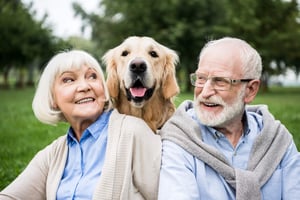
What You'll Learn
 Retirement is a gift, giving most older adults the extra time they have always wanted to enjoy favorite hobbies or to pursue a new passion. If your retirement plans include a canine companion, you are about to enjoy the additional benefits of having a dog. However, not all parts of dog ownership are easy, and you can give yourself and your new best friend the best relationship by making wise decisions. We’ve got a rundown of breeds that could be perfect to accompany you during retirement.
Retirement is a gift, giving most older adults the extra time they have always wanted to enjoy favorite hobbies or to pursue a new passion. If your retirement plans include a canine companion, you are about to enjoy the additional benefits of having a dog. However, not all parts of dog ownership are easy, and you can give yourself and your new best friend the best relationship by making wise decisions. We’ve got a rundown of breeds that could be perfect to accompany you during retirement.
Benefits of a Dog During Retirement
Dogs are excellent companions no matter your age. However, there are some benefits that will be especially healthy for you in retirement. For example, you will definitely log more steps and miles in your neighborhood during your daily walks together.
Dogs love a daily walk to stretch their muscles and explore; you’ll find you look forward to your walk outdoors just as much as your dog does. In fact, dog owners register up to 30 minutes more exercise per day than peers who do not have a pet. That increased exercise leads to healthier weight, decreased depression, and decreased risk of heart disease.
Of course, the benefits you get from owning a dog in retirement are much more than your daily romp outside. You will also get the natural stress relief that comes with dog ownership as well as decreased feelings of loneliness.
Labrador Retriever
Consistently ranking as America’s favorite dog breed, the Labrador retriever is an ideal companion for families and retirees alike. This breed is known for its friendly and eager-to-please personality, which is especially great if your home is busy with visitors. You’ll never have to worry about aggressive behavior toward your visiting grandkids or mail carrier. Instead, they are likely to greet visitors with a face lick.
Labrador retrievers need plenty of exercise but are typically not hyperactive if they miss an occasional walk. Further, their larger size means you won’t have to worry about tripping over them as you navigate your home.
Cavalier King Charles Spaniel
Spaniels are devoted dogs, and the Cavalier King Charles is no exception. These small dogs are known for their exceptional cuddling skills; they would much rather be on your lap than alone. Their smaller size also means they are well suited for apartment or condo living. Just be sure you are ready to make frequent trips to the groomer; these dogs need regular grooming to stay healthy and happy.
Goldendoodles
Varying in size depending on their type, goldendoodles are excellent companions. These adorable dogs feature soft coats and look just like teddy bears. Even better, they are less likely to cause an allergic reaction in most humans. While they are not fully hypoallergenic, people with dog allergies can often cohabitate with these dogs without needing to take daily medication.
These dogs are excellent companions and quite smart, which means you can spend some of your newly available retirement time learning new tricks together.
Shelter Dogs
You don’t need a purebred dog to get the benefits of pet ownership. In fact, a trip to your local shelter to look for a new pet can pass the benefits along to the dog and to the shelter. When you are searching for a shelter dog, talk to shelter experts about your current lifestyle and home. They will use this information to guide you to a dog that will be compatible with your life. Then, ask if you can foster a dog for a few weeks to see if the two of you are a match.
Finally, don’t discount senior dogs at your local shelter. These older dogs often have a kind and loving personality, and most are quite young at heart. You’ll love spending time with a senior dog who is always ready for your next adventure.
Remember, if you are considering retiring in a senior living community, ensure they are pet-friendly. Your dog will love the extra attention and socialization they receive in a busy senior living community just as much as you will.
Learn more about retirement hobbies and how to make the most of your new time by downloading our free resource, “The Busy Person’s Guide to Recreation in Retirement.”

